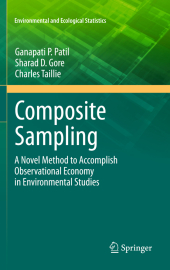 Neuerscheinungen 2013Stand: 2020-01-07 |
Schnellsuche
ISBN/Stichwort/Autor
|
Herderstraße 10
10625 Berlin
Tel.: 030 315 714 16
Fax 030 315 714 14
info@buchspektrum.de |

Sharad D. Gore, Ganapati P. Patil, Charles Taillie
(Beteiligte)
Composite Sampling
A Novel Method to Accomplish Observational Economy in Environmental Studies
2013. xiii, 275 S. 38 Tabellen. 235 mm
Verlag/Jahr: SPRINGER, BERLIN 2013
ISBN: 1-461-42789-4 (1461427894)
Neue ISBN: 978-1-461-42789-6 (9781461427896)
Preis und Lieferzeit: Bitte klicken
This monograph provides a comprehensive statistical account of composite sampling as an ingenious environmental sampling method to help accomplish observational economy in a variety of environmental and ecological studies.
Sampling consists of selection, acquisition, and quantification of a part of the population. While selection and acquisition apply to physical sampling units of the population, quantification pertains only to the variable of interest, which is a particular characteristic of the sampling units. A sampling procedure is expected to provide a sample that is representative with respect to some specified criteria. Composite sampling, under idealized conditions, incurs no loss of information for estimating the population means. But an important limitation to the method has been the loss of information on individual sample values, such as, the extremely large value. In many of the situations where individual sample values are of interest or concern, composite sampling methods can be suitably modified to retrieve the information on individual sample values that may be lost due to compositing. This book presents statistical solutions to issues that arise in the context of applications of composite sampling.
Introduction.- Classification.- Extreme Values.- Estimating Prevalence.- Bayesian Approach.- Inference on Mean and Variance.- Random Weights.- A Linear Model.- Site Characterization and Cleanup.- Spatial Structures.- Sampling of Soils and Sediments.- Sampling of Liquids and Fluids.- Indoor Air Pollution.- Bioaccumulation.- References.


